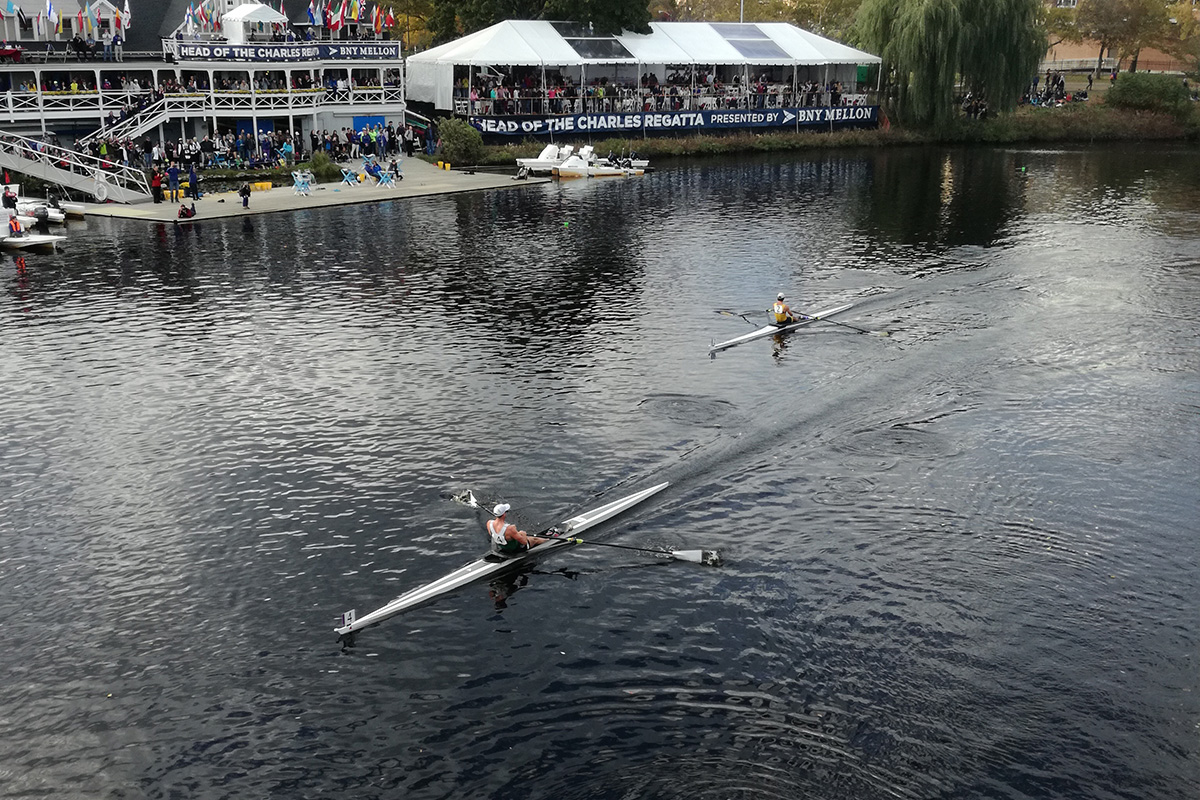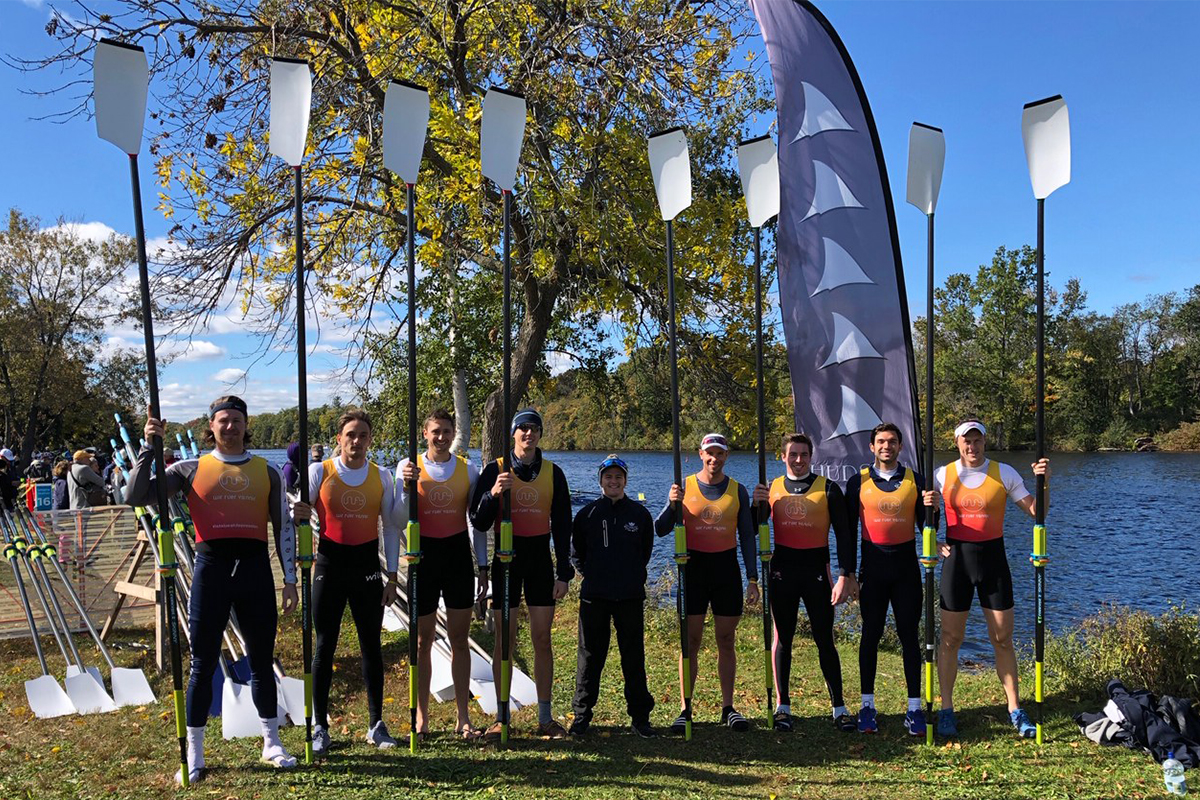Robbie Manson joins Team #wirfueryannic to talk about mental health
Alljährlich findet in Boston (Massachusetts) die traditionelle “Head of the Charles” – Regatta statt. Mit über 10.000 Teilnehmern gilt sie dabei als größte Ruderregatta der Welt. Über knapp fünf Kilometer geht es in verschiedenen Bootsklassen auf dem Charles-River am Bootshaus der legendären Harvard-University vorbei.
In diesem Jahr ging hier im Männer-Achter mit Steuermann eine Crew an den Start, die eine ganz besondere Botschaft auf den orangenen Einteilern trug: #letsbeatdepression! Unter diesem Motto legten sich dabei hochdekorierte Ruderer in die Riemen, um zusammen ein Zeichen für einen offenen Umgang mit psychischen Erkrankungen zu setzen. Dass sich hierbei Athleten aus Großbritanien, den Niederlanden, Neuseeland und Deutschland gemeinsam ins Boot setzen zeigt die hohe Bedeutung des Themas im Spitzensport. Wir bedanken uns daher ganz besonders bei den neun starken Botschaftern für #wirfueryannic:
- Sam Collier (Steuermann)
- Olivier Siegelaar
- Vassilis Ragoussis
- Karl Hudspith
- Björn Birkner
- Sebastian Devereux
- Maximilian Korge
- Felix Krane
- … und Robbie Manson.
“Coming out doesn’t magically make all of your struggles go away, neither does talking about mental health, but talking about it and having that support does help.”
Robbie ist der Gesamtweltcupsieger im Männereiner des Jahres 2018 und konnte 2017 auch den Weltrekord im Einer aufstellen. Er setzt sich seit Jahren für Aufklärung von psychischen Erkrankungen ein und scheut sich hierbei nicht, offen seine eigene Geschichte zu erzählen.
Kurz vor dem Rennen konnten wir mit ihm sprechen, um seine bewegte Geschichte zu hören. Erfahrt mehr über Robbie und wie er ein Teil der Wirfueryannic-Community wurde:
Robbie, you’re a two-time-olympian and the fastest rower in the world, setting a new world best time in the single in 2017. What is your biggest motivation to still continue with top-level competitive rowing? What do you love about doing sport?
What I love most about rowing is the people and the culture. Having a clear goal gets me out of bed in the morning. Being surrounded by hard working, like-minded people makes me feel as though I am a part of something greater. As a sport we put our bodies through so much and I think that gives all of us a mutual respect and understanding for each other and this brings us closer together. I have so many amazing friends both at home and all around the World, right from when I first touched an oar and I’m still making new friends and meeting more amazing people now. It’s about so much more than pulling on an oar or in my case sculls.
2018 has been a real mixture of emotions for you – unbeaten during the world cups, but then “failed” to win a medal at the world championships in September. How do you deal with disappointing results?
I usually pick myself up, dust myself off and vow to train twice as hard next time. This time it has been different. I feel as though I trained harder than I have ever trained in my life in the build up to this years World Champs, far too hard in hind sight. This time I have reflected more on the imbalances in my life. I have put absolutely everything into rowing for such a long time. I tend to put a lot of pressure on myself, if I don’t win I feel like a failure. If I am going to continue I think I need to get back to what I enjoy about the sport and also enjoy life and have goals outside of rowing.
You opened up on the issue of depression, telling your own story of struggling to break the stigma associated with Mental Health. When did you realize that talking about it in public would help others who are suffering as well?
It has only been something I have felt comfortable enough to talk about recently. I have experienced both anxiety and depression, a lot of the time they go hand in hand. I think hearing and realising that having these struggles is more common than I thought has helped me. I thought maybe if I talk about it too it can help others and further normalise talking about mental health. I think it is a bit like me sharing the story of my sexuality and the struggle to come to terms with that. At the time you feel alone and think you’re the only one going through it. “Coming out” doesn’t magically make all of your struggles go away, neither does talking about mental health, but talking about it and having that support does help.
High-performance sport is a very competitive field, with athletes facing high pressure and high expectations. People next to you are either your coaches who make decisions about selections, or training partners who are also your biggest rivals for a spot in the teams. What is your recommendation for other athletes when they realise that they are struggling mentally with this kind of pressure?
I think that does make it hard, I’ve found that for sure. I don’t want to talk about my mental health for the fear of appearing weak to opposition or the fear of not being selected. I guess that’s a risk I am now willing to take. I think there is actually strength in vulnerability and honesty, maybe we will start to learn that. It doesn’t mean I won’t be trying to absolutely crush it when I’m out on the water, I love racing!
For the upcoming Head of the Charles Regatta you are joining the ExitEight, wearing the colourful Wirfueryannic-Jersey. How did you get in touch with them and why do you support this project?
I was asked by Vassilis if I would be a part of the crew, initially I just wanted to race the single at the HOCR this year, but then I thought that it is a very important cause. It is relevant to me and a lot of people in a similar situation to me. Both the LGBT community and other athletes, therefore I wanted to support this project.
Another point that I would like to add is that I think social media can impact peoples mental health. I know I struggle with it at times. It is largely a highlights reel but then we are sucked into thinking that everyone is living these perfect lives and we are inadequate. Sometimes I feel like this. But I’m also guilty of being on the other side. I post the highlights of my life because I want to feel liked or validated. That is another motivation for sharing my story, to be more “real” on social media. I am very lucky and get to do some amazing things but we are all human and we are all more similar than we sometimes realise. Social media can be a very useful tool in a lot of ways but I think we also need to be careful how we use it.
Hinter der Story
Das Interview führten Philipp und Björn Birkner. Björn ist ein wichtiger Inititator des Projekts ExitEight ist. Gemeinsam mit seiner Mannschaft trägt Björn die Botschaft von Wirfueryannic e.V. auf internationalen Regatten in die Welt hinaus und holt damit stets neue Botschafter, wie Robbie ins Boot. Wir sagen Danke Björn & Danke ExitEight! #letsbeatdepression
[mkd_separator class_name=”” type=”normal” position=”left” color=”#f2902f” border_style=”solid” width=”150px” thickness=”3″ top_margin=”50px” bottom_margin=””]
Der Verein Wirfueryannic e.V. ist als gemeinnützig anerkannt. Steuerlich absetzbare Spenden ermöglichen uns, das Team #wirfueryannic bei Veranstaltungen zu unterstützen, um Aufklärung, Hilfe und Prävention rund um die Volkskrankheit Depression zu fördern.
[mkd_button size=”” type=”” text=”Spenden” custom_class=”” icon_pack=”simple_line_icons” simple_line_icons=”icon-heart” link=”/spenden” target=”_self” color=”#fff” hover_color=”” background_color=”” hover_background_color=”” border_color=”” hover_border_color=”” font_size=”” font_weight=”” margin=””]







Hinterlasse einen Kommentar
An der Diskussion beteiligen?Hinterlasse uns deinen Kommentar!